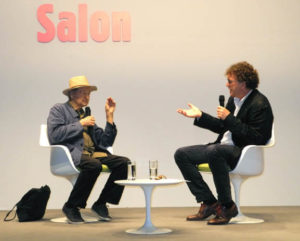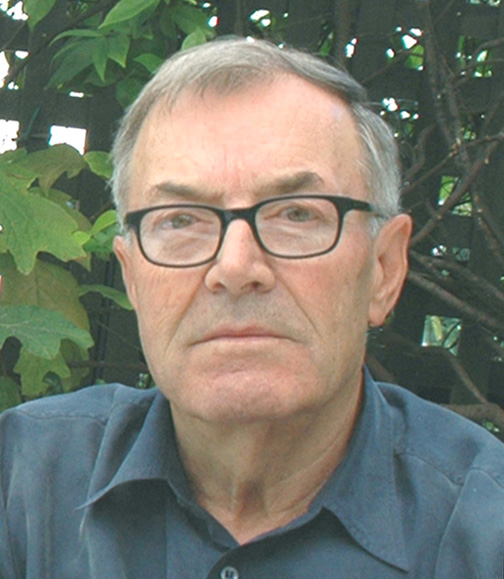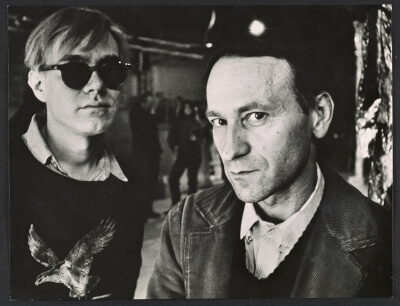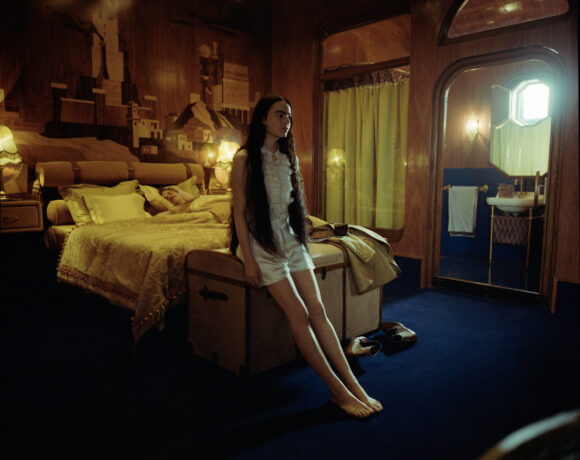The movie director, poet and artist Jonas Mekas, considered a master by the Italian and European filmmakers as well as by the New American Cinema ones, was born in Lithuania in 1922. Together with his brother Adolfas, he was the founder of the Film Culture magazine and the co-founder of the Anthology Film Archives. His prominence is having taught several generations to interpret the reality with immediacy and sensitivity, without any scheme, giving precedence to the profound truths of everyday life.
During the Art Basel week, last June, I had the pleasure of meeting him, just before the screening of Reminiscences of a Journey to Lithuania from 1972. The film, of diaristic nature, was commented on with heartfelt emotion by his own voice. Both before and after the screening he avoided formalistic and celebratory introductions by the curator giving immediately room to the questions from the audience.
Answering the questions, he entered into the merits of his work, proving to be open to dialogue, frank, kind and, at the same time, inflexible.
That evening was a unique opportunity to understand his strong character, the love for his homeland, his unconventional and poetic production and the symbiotic relationship between man and his work.
Taking advantage of his availability, I interviewed him via email and, on August 7th, after his return to New York from the Locarno International Film Festival, he sent me the following answers:
Luciano Marucci: In short, when you left Lithuania for the US, how did moving from the village to the metropolis, from the unaffected rural society to the modern and contaminated one influence your life and artistic path?
Jonas Mekas: You sent me so many questions. to really answer them well I’d have to write a book. Since I have very little time, I’ll answer them only briefly.
In l949 I didn’t move to New York from Lithuania: I moved to New York after one year in the nazi forced labour camp and five years in the postwar Germany Displaced Persons camps. As far as the influences go, absolutely EVERYTHING influences me, not only the surroundings, be it rural or urban.
In the poetries and films of that time, were there explicit references to the new world where you lived?
My written poetry refers to my interior life and my films refer, via images, to my exterior life.
Did the avant-garde artists, such as Warhol and the intellectuals, appreciate your works?
I liked what Andy was doing and Andy liked what I was doing. We were good friends. As for the “intellectuals” I am not sure what an intellectual is.
Practically, was your experimental cinematography born from a natural vocation and did it grow up when you entered into the living reality?
I entered the living reality when I was born. I cannot tell precisely when the Muse of cinema entered me. Possibly, when I landed in New York.
Did the difficulties of your life contribute to the definition of your poetry?
As I already said in #1, absolutely everything contributes to what I do, what I am. What I read, what I see, what I listen to, people I meet, absolutely everything.
I think the Italian filmmakers have taken you as a model especially for your ability to investigate and to film the human behaviors of everyday life. Do you agree?
I have had no many chances to see the contemporary young Italian cinema so I cannot comment on your question. The only thing I can say is that the diaristic interest in the arts that has emerged after the Second World War was a desire to democratize, to personalize arts that had become too academic. There was a desire to come closer to the real, daily life.
How do you rate the Italian Experimental Cinema of the Sixties and Seventies?
From what I have seen, during the Sixties and Seventies – and some more recently in my memory – the bad thing is that in most cases I had no chance of re-seeing again any of the films that I managed to see at least once. Italian film avant-garde of that period differs only in its scope and passion from what happened in USA, France and London. The feeling I got that it never really got off the ground, it remained a very much heroic undertaking of a very small number of individual film-makers, never becoming a movement, which would have solidified it and made it more visible and inspiring, and accessible. It was sort of a kind of Invisible Cinema which only now is becoming Visible.
Do you think that being considered a leader of a movement also in Europe encouraged you to go your own way; did you feel the pride to have introduced a cinematographic nonconformist language?
I never was a leader, and I’ll never be a leader. At best I am a helper, a midwife, somebody who protects the ‘newly born’ – and I do it very naturally, as my normal daily human activity – there is nothing special about it.
How do you consider the Italian Neo-realist films the postwar period?
The Italian postwar neorealist cinema period was VERY important to cinema and to myself. Rossellini, De Sica, Zavattini were a great inspiration to many film-makers of my generation.
Did you always to be involved into the commercial cinema system or Hollywood’s filmmakers refused your not deliberately spectacular production?
I do not avoid Hollywood: they avoid me. They do not need me. Plus the reality that I am interested as the content of my cinema doesn’t exist in Hollywood, it’s a wrong place to search for it. The content of my cinema is my life and life close around me. And I find that life VERY SPECTACULAR!
Could you earn a living by independent cinema of limited circulation?
I never earned my “living” from my films or poetry I always earned it by doing paid everyday social/physical work.
Is that kind movie also free from the political system? Has your art some social function?
Everything under the sun has a social function/meaning. Also, everything under the sun “political” meaning/effect.
Is the diaristic format, with or without metaphors, is the most suitable way to document real events?
The diaristic filming is the only kind of filming that records actual unrehearsed unstaged reality in front of the camera. The reality is full of metaphors. All life is full of metaphors.
In order to have quality outcomes, not only from an aesthetic point of view, do you consider essential to master the cinematic techniques?
Any child, beginning age 3 today knows how to use a movie camera. The extent of knowledge in film technology and craft depends on what one wants to do with the camera. No child of 3 (and not even me…) will be able to make a James Bond movie without the craft and knowledge that it takes.
In your movies do you avoid the narrative fiction and the well-designed structure? Do you prefer to point the lens mainly on simple behaviors of ordinary people?
My movies are full of narratives and fictions, and they ALL have structure and I do not film “simple behavior” I only film ecstatic moments of daily reality.
You never correct the technical imperfections of the used equipment, more or less professional: is this for the sake of truth?
In a diaristic cinema there are no “imperfections”: what some may call technical imperfections or mistakes, are part of the content of the diaristic cinema.
What the camera represents for you?
Camera is a tool, like knife and a drum stick are tools, a tool that helps me to record images of reality around me which can be then projected on a screen; yes, camera is a tool.
Do you consider yourself a filmmaker and director-producer with a farmer soul ?
I am not a producer. I am a filmer, I am a maker of films. And yes, I grew up on a farm, so deep inside I am still a farmer. Not in my soul, but in my practices. As re.[gards] my soul, my soul is not from a farm: my soul is from the spiritual world.
During your staying at Art Basel you acted with youthful vitality. Where do you get so much energy from?
My energy comes from energy of the world I live in. Energy of the world I live in is inexhaustible. And the world I live in is the spiritual world. I do not really live in the “real” “world”. I only record it.
In the poems of these years what kind of topics do you deal with the most?
The content of my poetry is my inner world and the instantaneous, thoughtless, konfu-like, via my camera, reactions to the outside world. No topics.
 Andy Warhol and Jonas Mekas (Sixties)
Andy Warhol and Jonas Mekas (Sixties)
 Stadtkino Basel, June 16th 2016: Mekas – before the screening of his film – point the lens on Luciano Marucci who, in his turn, him takes photos
Stadtkino Basel, June 16th 2016: Mekas – before the screening of his film – point the lens on Luciano Marucci who, in his turn, him takes photos
 Still from film by Mekas “Reminiscences of a journey to Lithuania”, 1972, 1h 28’
Still from film by Mekas “Reminiscences of a journey to Lithuania”, 1972, 1h 28’
 Mekas answers to audience’s questions at the end of his film (ph L. Marucci)
Mekas answers to audience’s questions at the end of his film (ph L. Marucci)
 Basel, June 17th 2016: the eclectic British artist Douglas Gordon with Mekas at the Fondation Beyeler after the conversation-performance with Hans Ulrich Obrist and the audience
Basel, June 17th 2016: the eclectic British artist Douglas Gordon with Mekas at the Fondation Beyeler after the conversation-performance with Hans Ulrich Obrist and the audience
 Mekas at Fondation Beyeler with Obrist as a performer (Basel, June17th 2016)
Mekas at Fondation Beyeler with Obrist as a performer (Basel, June17th 2016)
 Art Basel Salon, June18th 2016: Mekas in conversation with Bernd Scherer (ph L. Marucci)
Art Basel Salon, June18th 2016: Mekas in conversation with Bernd Scherer (ph L. Marucci)
How do you express your current cinematographic activity?
By filming, filming, filming…
Do you still want to be present in our own time with the visual diaries with your own distinct identity and participate in the transformations of the reality in progress? Is it your option to relate with others?
BUT I am still HERE! You even met me, physically, in Basel! How can I be HERE on this planet and not be with others, part of humanity??? I cannot be in any other TIME, I can be only here and now! And of course, you can see my new work every week, at jonasmekasfilms.com which means, I am participating in the life of this planet!
Do you consider the archive of experimental and independent films you made as a cultural initiative, able to support that specific production, which, by the way, did not have sufficient recognition? Is it also a work that legitimizes your experience through the cinema?
I do not make experimental films. Nobody does! I just film, I just MAKE films. And so did Brakhage, and so does Kenneth Anger – we DO NOT EXPERIMENT!!! And it has nothing to do with a “cultural initiative” or “production”, or legitimization! We are poets of cinema and we cannot be in any other way and we do not need recognition or legitimization. We are here!
If I’m not mistaken, in the film Reminiscences of a Journey to Lithuania, projected in Basel, rather than dwell on the contemplative aspects of romantic nature, you have preferred to promote the traditional human values of your farming family, avoiding filters and superstructures in favor of the existential truth.
I am not promoting “traditional human values” in my film When I was filming in my native village, my only wish was to record some details of my native village, so that I would have something to show to my friends so that they could have some idea about the background I come from. I did it for myself and for my friends.
That movie also surprises for the naturalness of the ‘actors’ behaviors. Did you make the shooting also secretly?
No, nothing was done in secret. I never film in secret. Everybody knew I was filming but nobody cared about it because I was there not as a film-maker. I was there as part of life. I was invisible. I was the invisible film-maker.
Luciano Marucci

I’m Luciano Marucci, born by case in Arezzo and I look my age… After a period in which I dedicated myself to journalism, applied ecology, environmental education and traveling the world, I occasionally collaborated as an art critic with specialized magazines (“Flash Art”, “Arte & Critica”, “Segno”, “Hortus”, “Ali”) and with varied cultural periodicals. Since 1991 in “Juliet” art magazine (in print and edition) I have regularly been publishing extensive services on interdisciplinary topics (involving important personalities), reportages of international events, reviews of exhibitions. I have edited monographic studies on contemporary artists and book-interviews. As an independent curator I have curated individual and collective exhibitions in institutional and telematic spaces. I live in Ascoli Piceno.







NO COMMENT